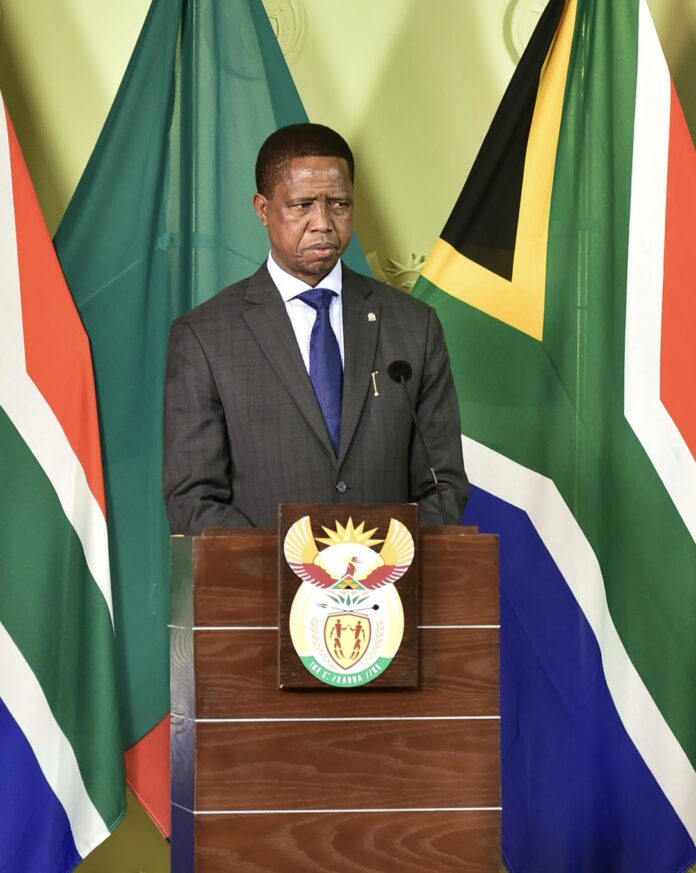By Simphiwe Zungu
By all standards of decency, the death of a former head of state should be a moment of collective reflection, solemnity, and unity. It should be above politics, beyond factions. But in Zambia today, even death has not been spared the suffocating grip of political division. The passing of Dr Edgar Chagwa Lungu, Zambia’s sixth president, has plunged the country not into national mourning — but into a full-blown political crisis. It has revealed not only the depth of tensions between the ruling government and the opposition but also the disturbing extent to which President Hakainde Hichilema’s administration has corroded the democratic spirit of Zambia. Lungu died on June 5, 2025, in Pretoria, South Africa, after weeks of treatment for chest complications. His daughter, Tasila Lungu, confirmed the news in a dignified and solemn statement from Lusaka. She appealed to the nation to embrace unity and dignity during the mourning period, invoking her father’s lifelong devotion to “One Zambia, One Nation.” But those words, once a symbol of national solidarity, now feel tragically ironic.
Instead of ushering in a period of respectful tribute, Lungu’s death has exposed an alarming undercurrent of authoritarian control. What should have been a national moment of healing has turned into a bitter symbol of exclusion, censorship, and calculated political manipulation. At the heart of this turmoil lies a dangerous truth: under Hakainde Hichilema, Zambia is quietly descending into an unspoken calamity — one marked by the weaponization of state power, the erosion of democratic norms, and the marginalization of dissent. According to several credible sources at Mediclinic Medforum Hospital in Pretoria, the Zambian government moved swiftly after Lungu’s passing — not to console his grieving family or consult the opposition PF, but to seize control of the situation. Officials reportedly instructed medical staff not to release documentation or updates to the family, declaring the matter a “state funeral.” On the surface, this sounds like an honor. In practice, it has become a veil of secrecy — and a tool for exclusion.
Members of the Patriotic Front (PF) and the Lungu family have voiced outrage over being shut out of the funeral planning process. Instead of collaborating with the former president’s loved ones, the UPND government has allegedly chosen to isolate and dominate — reducing what should be a moment of unity to a game of power politics. “This is not how you treat a man who once held the highest office in the land,” said a PF official in Johannesburg. “President Hichilema and his team are using this moment to politically erase a legacy they despise.”
It is hard to disagree. The refusal to include Lungu’s immediate family in funeral arrangements is more than a bureaucratic slight — it is a direct insult. A deliberate effort to reshape the narrative. A continuation of Hichilema’s mission to delegitimize all that came before him. PF Secretary General Raphael Nakacinda gave voice to the growing anger during a media roundtable in Sandton, South Africa. In no uncertain terms, he condemned the UPND government’s handling of Lungu’s passing and demanded full participation from the family and PF in the repatriation and burial.
“The funeral of a former head of state cannot be orchestrated behind closed doors,” Nakacinda insisted. “The party, the family, and the people of Zambia deserve transparency and inclusion. Anything less is an affront to democracy and national unity.” These words resonate deeply with a population that increasingly feels shut out of their own political process. Under Hichilema, many Zambians — especially those who supported the PF or come from perceived “non-favored” regions — feel invisible. Forgotten. Ignored.
The treatment of Lungu in death mirrors the broader marginalization of his supporters in life.Zambians across the diaspora, particularly in South Africa, are not taking this quietly. A growing protest movement has emerged under the banner “Suffering Lungu, Even in Death,” organized outside the Zambian High Commission in Pretoria. These protests aren’t just about funeral arrangements — they’re about something far deeper: the collapse of democratic accountability.
“HH and his people said Lungu wouldn’t make it to 2026 — and they made sure of it,” said one protester. Though such statements are speculative and inflammatory, their emotional intensity reveals the level of distrust and paranoia Hichilema’s governance has sown. That citizens can even contemplate such accusations shows how badly faith in the state has eroded.
Another protester said, “We are not mourning just a man — we are mourning our democracy.” These are not the words of radicals — they are the cries of patriots who no longer feel heard, respected, or represented by their government.
The events following Lungu’s death have reignited accusations long simmering beneath the surface. President Hichilema has been increasingly accused of tribal favoritism, elitist economic policymaking, and systematic repression of dissent. Journalists critical of the government report surveillance and intimidation. Opposition leaders are dragged through prolonged legal entanglements. Public debate has given way to political theater, where dissenters are labeled as destabilizers.
In this environment, it is no surprise that the funeral of a former president becomes yet another battlefield. The UPND’s attempt to control Lungu’s burial arrangements is emblematic of a broader trend: the centralization of power under Hichilema and the exclusion of all who challenge his narrative. Once heralded as a reformist, HH now presides over an increasingly autocratic system — one in which unity is preached but not practiced, and inclusion is promised but rarely delivered.Let us be clear: Edgar Lungu’s presidency was not without controversy. Critics have pointed to his administration’s struggles with corruption, press freedom, and economic stagnation. But those shortcomings do not erase his impact. He led Zambia through a critical transition period, maintained relative peace, and represented the hopes of millions — particularly among working-class and rural populations.
Lungu’s commitment to national identity and cultural continuity resonated with many Zambians. His motto, “One Zambia, One Nation,” was not mere rhetoric. It was a guiding principle, one that sought to keep the country united through challenging times. To sideline his family and erase his legacy is to insult not just the man — but the millions who saw themselves in his leadership. What we are witnessing in Zambia is not just a political dispute. It is the slow unraveling of a nation’s soul. The exclusion of the Lungu family, the repression of protests, and the manipulation of state processes are not isolated acts — they are symptoms of a deeper malaise. Under Hichilema, Zambia has lost something intangible but essential: the sense of being one people, bound by shared values, mutual respect, and democratic ideals. This is the unsaid calamity of Hichilema’s rule. Not a dramatic collapse, but a quiet, methodical undoing of Zambia’s democratic fabric. A government so insecure in its legitimacy that it cannot even allow a family to bury their patriarch in peace. President Hichilema stands at a crossroads. He can either double down on control — isolating the PF, muzzling dissent, and monopolizing the narrative — or he can choose the path of unity, humility, and respect. A transparent, family-inclusive state funeral for Edgar Lungu would be a start. But it cannot end there. The President must begin a process of genuine national dialogue — one that includes opposition voices, civil society, and marginalized communities. He must rebuild the trust he has shattered. Because no matter how strong a regime may appear, it cannot survive without the consent of its people.
Lungu’s body remains in South Africa. His family remains excluded. His supporters remain furious. And the nation remains on edge. This is more than a political scandal. It is a warning. If Zambia cannot honor its past with dignity, it cannot build a future with integrity. If even death becomes a tool of division, what hope remains for life? The people of Zambia — from Lusaka to Pretoria, from Kasama to Livingstone — are watching. They are remembering. And they are demanding more. Because “One Zambia, One Nation” was never meant to be a slogan. It was meant to be a promise.
And right now, that promise is being broken.


